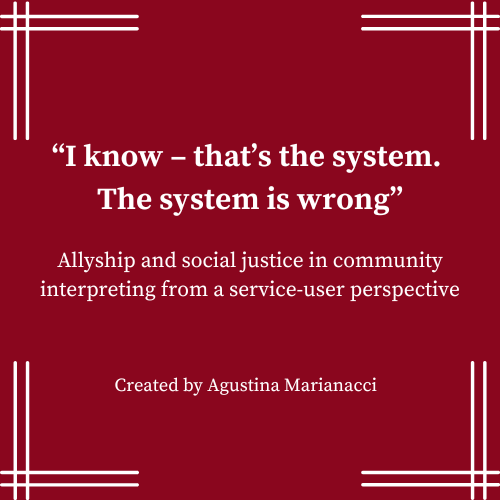Defined as the practice of gaining awareness and acting upon the oppression of marginalized groups, allyship can account for the power interpreters hold in systems of oppression and can contribute to social justice. This article reports on a study designed to explore allyship in spoken-language interpreting from the perspective of culturally and linguistically diverse (CALD) users of interpreting services. Involving CALD individuals – foreign-born people in English-speaking countries who do not speak English at home – from the Latin American community living in Aotearoa New Zealand, the study explored users’ perspectives on the role of interpreters, their perceptions of allyship and social justice, and the way these concepts inform interpreting practice. The study employed a culturally affirming horizontal methodology that relied on four one-on-one dialogues with users of Spanish-speaking interpreting services about their experiences in various community settings. This was followed by one group dialogue involving users, English–Spanish interpreters and a community representative. The findings suggest that users prefer humane and caring interpreters with a flexible understanding of their role. Aware that social marginalization is intrinsic to community interpreting, they highlighted the reality that mere message transfer and language proficiency are insufficient for CALD individuals to secure access to statutory services and that inadequate assistance can be (re-)traumatizing. The users’ perspective therefore conflicts with the prevailing rules-based approach to ethics in interpreting and its focus on accuracy in interpreting over social and relational skills. To overcome the disparity between users’ expectations and entrenched concepts of neutrality and non-intervention, allyship stands as a potential lens through which to develop a nuanced and flexible understanding of the community interpreter’s role, as well as culturally grounded redefinitions of ethicality and professionalism in the field.

